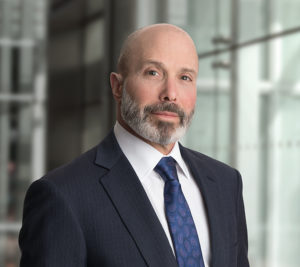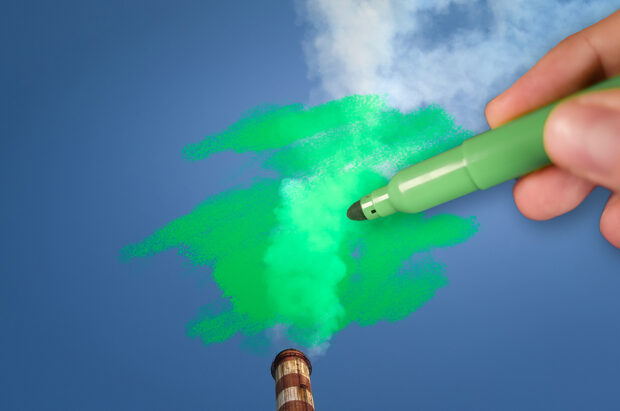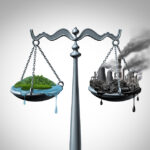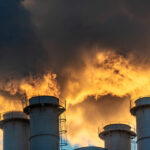In addition to predicting greater geopolitical volatility driven by global food and energy insecurity, Chubb’s chief executive warned carriers to brace for greenwashing lawsuits on the horizon—against D&O insureds and insurers themselves—at an industry gathering yesterday.
Speaking at the 38th Annual S&P Global Ratings Insurance Conference, Chubb Chair and CEO Evan Greenberg offered the prediction and explained Chubb executives’ reluctance to set net zero emissions targets for the carrier as he responded to a question about underwriting priorities during a Fireside Chat session with S&P Senior Director Larry Wilkinson.
Beginning his answer with some thoughts about economic and social inflation, Greenberg expounded on growing underwriting problems tied to litigation trends. “Looking ahead there, I’m concerned when it comes to ESG-type issues, especially around climate change right now, and directors and officers liability. When I think about greenwashing: Every company that is declaring themselves, that [their] company is going to be net zero—that sounds great in the beginning.” But those companies, very quickly, will be forced to disclose, “What’s your progress? How are you moving along in achieving that?”
“If it’s just vague words, there are going to be a lot of shareholder suits because companies are over promising,” he asserted.
Chubb’s leader went on to suggest that insurers and reinsurers that are committing to net zero targets are setting themselves up for the same fate, as he also explained why Chubb will not join those insurers until it figures out how to demonstrate progress.
“When insurance companies are declaring net zero, [it] means that for your underwriting portfolios you’ll know the carbon footprint of all your insureds collectively globally, and therefore you’ll be able to show how it’s going down and ultimately to zero. The tools don’t exist today. And at some point, that’s going to be called out in suits,” he said.
At Chubb, “we have not declared ourselves to be net zero because we can’t imagine as a company how we can actually achieve that…The ability to measure the carbon footprint of our portfolio—we don’t know how to do that. No company knows how to do that. So, until we know how to do that, and we see a realistic path to it, we can’t really declare ourselves net zero,” he stated later in the session when Wilkinson asked him more specifically to describe how climate change is influencing Chubb’s underwriting and investment decisions.
Greenberg described both activities as “holistic and balanced” while underscoring the regulated insurance industry’s obligation to amp up services for policyholders impacted by climate events and also to support the oil and gas industry.
“We have a clear view at this time of how we approach our responsibilities in climate change,” he said, noting that the insurer—like society—has “competing priorities that are intentional.”
“On one hand, we have an obligation, both personally and corporately, to support the globe [in] moving toward net zero…On the other hand, we have an obligation to also support energy security and to support society in what is lawful. That’s expected of an insurance company, and we’re a regulated business, and we’re expected to execute our responsibilities that way.”
After providing his justification for Chubb’s reluctance to set net zero targets for itself, Greenberg stressed that Chubb is working to support industries that are either helping companies and individuals reduce their carbon footprints or to create new technologies that produce energy that is carbon free. “We are insuring those activities and developing more technical ability to do that,” he said, adding that in Chubb’s investment portfolios, the global insurer is also increasingly investing in new technologies that will advance carbon neutrality.

“When insurance companies are declaring net zero, [it] means that for your underwriting portfolios you’ll know the carbon footprint of all your insureds collectively globally…The tools don’t exist today.”
Evan Greenberg, Chubb
“We’re continuing, on the other hand, to insure oil and gas because the world needs energy…We’re not doing things like coal and tar sands, where there are other options—those have true sustainability issues with them, and there are alternatives. [But] we don’t yet have great alternatives to gas and oil. And it would be irresponsible of us not to continue to insure those in a responsible way.”
“We’re trying to develop an ability to underwrite new projects in a scientific-based way where we can determine which ones are done in a more sustainable and responsible way and insure those while we may not insure those that are less so that way. We’re trying to find that balance,” he continued.
“Finally, our job is to provide more resilience related-services to help people while they face carbon-related weather until the world transitions. We’re working on the services in that regard.”
“So, it’s pretty holistic and balanced,” he said, summing up Chubb’s overall approach to climate change issues.
Referring to obligations to climate-impacted policyholders, Greenberg said those extend beyond providing insurance protection and being able to price and manage exposures “in a more precise way as volatility of weather increases from all kinds of perils all year long,” remarking that “there are no cat seasons any longer.” Beyond that, he said, insurers need to use their abilities “truly to provide greater services and resilience to customers, and to aid the society, as it is exposed while it moves to net zero,” he said, without offering examples of the services he had in mind.
Wilkinson began the Fireside Chat asking Greenberg to talk about the macroeconomic environment and some of the themes that Chubb’s chair discussed in his annual letter to shareholders earlier this year related to the Russia-Ukraine conflict and economic uncertainty.
Greenberg took the opportunity to introduce a theme he repeated several times, including during his discussion of the climate issue—the idea that food and energy security will be “great cause of geopolitical instability” going forward. “The energy shortages that are created as a result of cutting off Russian energy supply” will result in the developed world taking the vast majority of energy. “They’re going to take away from developing countries. And they’re going to suffer greatly,” Greenberg said.
“Food insecurity. That’s going to be a growing issue and we’re only at the beginning of that.”
“We’re going to feel those kinds of energy and food shortages that are going to create, in my mind, great geopolitical and political instability. And we’re going to feel more of it right here in the United States as well.”
“That leads to inflation generally,” he said, stating that beyond supply-and-demand forces, the Federal Reserve, in his view, “is behind the curve” in not recognizing that the nation is moving toward a period of potential stagflation. “The risk of that is much higher than it has been. And inflation is going to be more stubborn and more persistent. And you add to that Ukraine-Russia has poured gasoline on an already difficult supply environment. [And] we have China and its COVID policies, [which] have deeply impacted the supply chain.”
“That’s going to persist for a period of time, I’m afraid,” he said, also predicting that the Fed will be more aggressive in its actions, creating more volatility in financial markets.





















 The Future of HR Is AI
The Future of HR Is AI  Beyond Automation: The Emerging Role for Contextual AI in Insurance
Beyond Automation: The Emerging Role for Contextual AI in Insurance  10 Do’s and Don’ts of a Smart ORSA Report
10 Do’s and Don’ts of a Smart ORSA Report  State Farm Mutual to Pay $5B Dividend to Auto Insurance Customers
State Farm Mutual to Pay $5B Dividend to Auto Insurance Customers 















